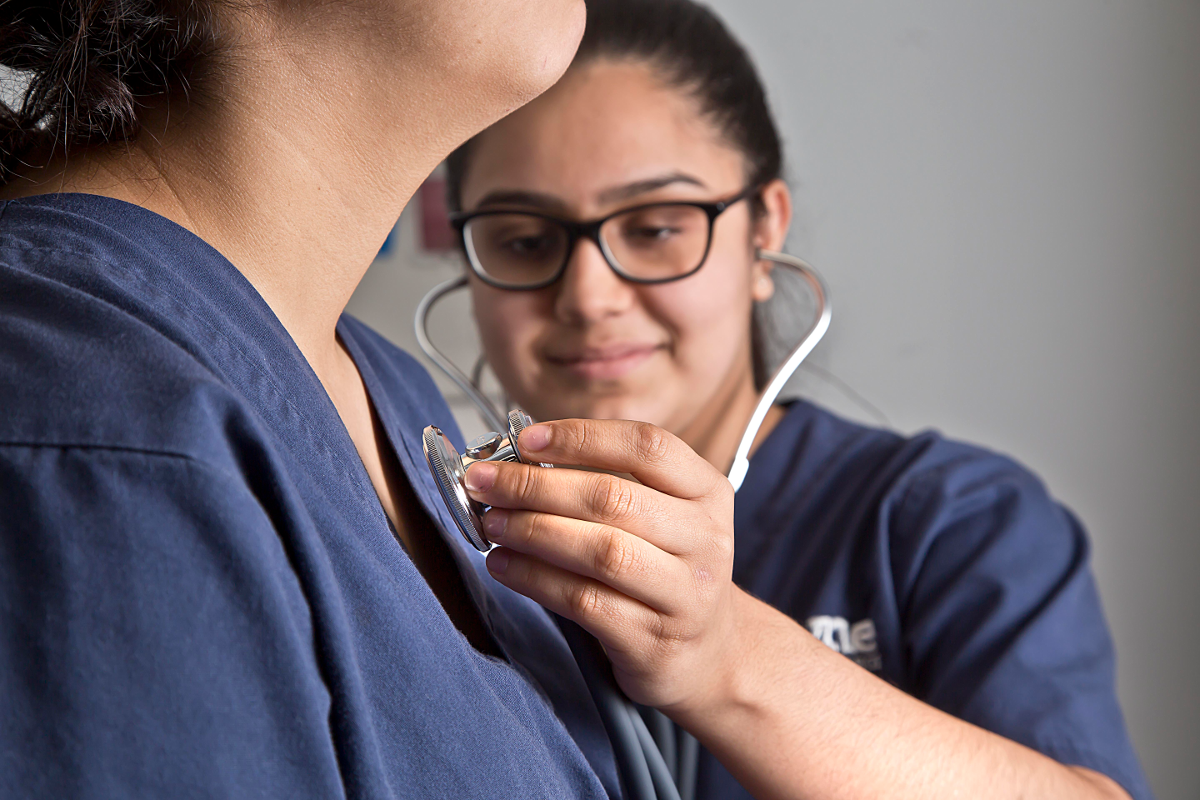Medical assistants are key cogs in the functioning of medical offices and facilities all across the country. Essentially jacks of many medical office trades, medical assistants perform a variety of tasks that doctors couldn’t get done on their own. Although medical assisting is an endpoint for some, for many others it is merely the first step of an evolution into becoming a more specialized member of the healthcare workforce.
That’s one of the advantages of pursuing a career as a medical assistant. The possibilities for continuing one’s education are essentially limitless. Below is a far from exhaustive list of career paths medical assistants have the opportunity to pursue with some additional schooling and field experience in the medical assistant occupation.
Medical Billing and Coding
Medical billers maintain the healthcare office’s or facilities’ financial records. They ensure that the practice receives proper reimbursement for its services from patients’ insurance companies. They also handle patients’ payments, the part of the bill the insurance doesn’t cover. Proper reimbursement is crucial to the functioning of the hospital, as it is how it covers the expenses of operating and maintaining the facility.
Medical coders, on the other hand, also deal with billing, but in a different way. They are tasked with translating procedures and diagnoses into their corresponding codes, as listed in the International Classification of Disease, Tenth Edition (ICD-10). These codes are universal throughout the world of healthcare. Additionally, medical coders commonly serve as intermediaries between the doctors and the office’s billing department. After all, the doctors are the ones who are writing what they have to decode.
Depending on the size and workload of the facility, these two roles may be combined. Medical billing and coding are frequently taught together in training programs offered at community colleges and vocational schools. Knowing how to do both can improve one’s job prospects following completion of the program.
Medical Office Management and Administration
Medical assistants are often tasked with handling some, if not most, of the office’s administrative tasks. This experience makes them prime candidates for furthering their education in medical office management and administration.
Medical office managers and administrators handle a slew of duties vital to the functioning of healthcare facilities, including planning budgets, signing off on spending, supervising office staff, and hiring new employees. Past experience working as a medical assistant can prove useful because medical assistants understand what it’s like to work in that role, allowing them to exhibit greater empathy for their employees.
According to O*NET, 65 percent of medical office managers and administrators have bachelor’s degrees, while approximately 20 percent of the workforce holds associate’s degrees. Associate degree programs in healthcare administration are frequent offerings at community colleges and vocational schools nationwide.
Nursing
Perhaps the most common profession that medical assistants make a transition into is nursing. There are many similarities shared by the two roles, though nurses typically have more responsibilities and capabilities within the office. It’s important to note that a medical assistant’s responsibilities may vary depending on where he or she is employed and the needs of the presiding doctor or doctors.
One reason such transitions are so common is that there are many different types of nurses. Many community colleges and vocational schools offer programs that bridge the gap between medical assistant and licensed vocational/practical nurse (LVN/LPN) occupations. There are also programs that bridge medical assistants and registered nurses (RNs) and which reward Bachelor of Science in Nursing (BSN) degrees at their conclusion.
At any rate, experience working as a medical assistant and having completed a medical assistant training program can provide aspiring nurses with a solid foundation for continuing their education and make the transition less burdensome.
Lead Medical Assistant
Going the extra mile and displaying leadership qualities can propel a medical assistant from a member of the pack to the leader of that pack.
Lead medical assistants take on more responsibilities, namely directing the other medical assistants. They also tend to receive a modest increase in salary following the achievement of the designation.
Physician Assistant
Physician assistants perform tasks such as examining patients, diagnosing them, administering treatment and participating in wellness outreach programs. As with medical assistants and LVNs, physician assistants’ responsibilities can vary from state to state and depending on the physician under whom they work.
Though it requires a bit more schooling, transitioning from working as a medical assistant to a physician assistant is certainly feasible. Having achieved the status of registered nurse, it usually takes another two years of schooling to complete a physician assistant program. Most physician assistant programs award master’s degrees at their conclusion.
The additional two years of full-time schooling will be rewarded with plentiful job prospects for those who pursue the occupation. According to data from the Bureau of Labor Statistics (BLS), the employment of physician assistants is anticipated to climb by 37 percent through 2026.
For many seeking a career in the healthcare industry, becoming a medical assistant is not an end, but a means to a future career in specialized healthcare. It all begins with the completion of a medical assistant educational training program.
Start Your Journey at Coyne College
Coyne College is one of Chicago’s top skilled trade educational institutions and is proud to offer its medical assistant program to future healthcare professionals. Coyne offers day and night classes for both programs to accommodate your busy schedule. Both programs are offered at the Coyne College campus, located in the heart of the Chicago Loop at the intersection of State and Madison streets.
Coyne College’s medical assistant program thoroughly prepares you to enter the healthcare field as a medical assistant. The program can be completed in as soon as 54 weeks.
As a medical assistant student at Coyne College, you will gain the necessary skills and knowledge to succeed as a medical assistant. Some of the topics covered in the program’s curriculum include:
- Medical Terminology
- Pharmacology
- Anatomy and Pathophysiology
- Basic Insurance and Billing
- Clinical Medical Assistsing
- And More!
You will learn the ins and outs of medical assisting in an environment surrounded by instructors dedicated to helping you succeed. Coyne’s highly knowledgeable instructors have years of meaningful experience in the workforce. Coyne College’s program also features a six-week portion dedicated to electronic health records.
All medical assistant students are required to complete an externship following the completion of all of the necessary coursework.
Following the completion of the program and your externship, you will be ready to enter the workforce as a medical assistant in any number of healthcare settings.
With more than 110 years of experience in helping aspiring skilled trade professionals realize their dreams, Coyne College has a well-developed network of resources to help students gain employment after they finish their studies.
Coyne College offers students career assistance, including mock interviews, externships and resume help. These resources can help students secure externships after completing the program.
Coyne’s students receive a well-rounded medical assistant education that provides them with a toolbox for success in the healthcare industry.
Start your journey to bettering the lives of patients today by visiting https://www.coynecollege.edu/.




